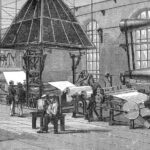“Against Human Flourishing.” Paul Griffiths gently suggests that the paradigm of “flourishing” may be inadequate to ascribe meaning to our lives and efforts: “Damage, flourishing’s apparent opposite, may have contributions of its own to make to what it appears on its face to contradict. It may provide its own characteristic adornments.”
“Tech Strikes Back.” Nadia Asparouhova explains the philosophy behind “effective accelerationism.” Parts of her narrative don’t make sense to me—she briefly notes that e/acc is in tension with effective altruism, yet the underlying philosophy of both movements seems congruent to me even if they have prudential disagreements about AI, and Asparouhova frames e/acc adherents as having “greater humility” than previous generations of techies, which is hard to square with their bold declarations. Still, this is a helpful account of an influential (and, I think, pernicious) ideology: “Despite the criticism, e/acc persists, and is growing, in the tech hive mind. E/acc’s founders believe that the tech world has become captive to a monoculture. If it becomes paralyzed by a fear of the future, it will never produce meaningful benefits. Instead, e/acc encourages more ideas, more growth, more competition, more action.”
“A Paper Manifesto.” Elizabeth Stice commends the virtues of a revolutionary technology: paper. “All too often we think that because the times we face are unique and new, the only possible solutions to our problems must also be new and unique. Fortunately, that isn’t always the case. Sometimes older, cheaper alternatives are around.”
“Christendom After Comcast.” John Ehrett admits he doesn’t have any good solutions to the disruptions of a global internet, but he outlines the effects of communications technologies that fundamentally change the nature of local community and church life: “With travel costly and difficult, novel and unsettling ideas were harder to come by. One simply did not know what others were saying and doing on the other side of the country, or the globe, except in the most mediated fashion. Instead, one’s mind was taken up by the problems and concerns of one’s immediate environs.” (Recommended by Adam Smith.)
“America’s Greatest Explorer.” In this excerpt from his new book, Jeremy Beer holds up Francisco Garcés as a fascinating, courageous, and peaceable figure who has been unjustly overlooked: “Garcés’s multiple months-long treks into the unknown and dangerous wilderness make him one of the greatest pathfinders in American history. Scholars continue to unpack the anthropological and ethnological data Garcés gathered on his travels. His explorations facilitated the settling of California. If not for the friar’s exploits, San Francisco and Los Angeles might not have been established for many years, and a Spanish society might have failed to take root before the onslaught of the American Gold Rush, depriving California of a major component of its religious and cultural heritage.”
“Agrarianism.” I talked with Nathan Gates about the history and philosophy of agrarianism for the Doomer Optimism podcast.
“This Forgotten Valley.” Brian Miller describes a “somewhere” valley that he recently visited to purchase some lambs: “Every few miles I pass through a compact hamlet, and for the last hour and a half to my destination I do not spot a single fast-food restaurant or—and this is more tragically impressive—a dollar store. There are plenty of family diners, small-time tractor dealers, and a scattering of feedstores.”
“Agriculture Built These High Plains Towns. Now, It Might Run Them Dry.” Kevin Hardy and Allison Kite report on efforts to coordinate the use of the Ogallala Aquifer so that farms and communities can continue to draw on its water responsibly: “the disappearing water is threatening more than just agriculture. Rural communities are facing dire futures where water is no longer a certainty. Across the Ogallala, small towns and cities built around agriculture are facing a twisted threat: The very industry that made their communities might just eradicate them.”
“The Revolution That Died on Its Way to Dinner.” Joe Fassler looks at the abyssal failures that continue to dog efforts to manufacture cultivated meats: “Investors will no doubt be eager to find out what went wrong. For the rest of us, a more pressing question is why anyone ever thought it could go right. Why did so many people buy into the dream that cultivated meat would save us? The answer has to do with much more than a new kind of food. For all its terrifying urgency, climate change is an invitation — to reinvent our economies, to rethink consumption, to redraw our relationships to nature and to one another. Cultivated meat was an excuse to shirk that hard, necessary work.”
“Small Is Bountiful.” Bill Kauffman gives high praise to the man behind the recent publication of The Decentralism Files: “There hasn’t been a politico in our lifetimes who has combined wit with an inappetence for controlling others quite as potently as Vermont’s John McClaughry.”
“The Awfulness of Elite Hypocrisy on Marriage.” Brad Wilcox calls out the damaging hypocrisy of people who are reluctant to name the goods of marriage: “Many elites today—professors, journalists, educators, and other culture shapers—publicly discount or deny the importance of marriage, the two-parent family, and the value of doing all that you can to ‘stay together for the sake of the children,’ even as they privately value every one of these things. On family matters, they ‘talk left’ but ‘walk right’—an unusual form of hypocrisy that, however well intended, contributes to American inequality, increases misery, and borders on the immoral.”
“The Permanent Vacation.” Chris Christou draws on Byung-Chul Han to diagnose the condition of homo turista: “The new human-tourist cyborg was already afoot, decades ago, we simply didn’t have the eyes or distance to see it clearly. In the rearview mirror of our century, culture has been eclipsed by hyperconsumption and the result is a condition that is entirely touristic, transitory, and treasured. In the absence of culture, what’s borne into the world today is homo turista.” (Recommended by Dominic Garzonio.)
“Christopher Lasch.” Current has assembled a two-part set of reflections on Lasch’s legacy, thirty years after his death. Part 1 includes Catherine Tumber and Christopher Shannon, and part 2 includes Susan McWilliams Barndt, Dominic Aquila, and Eric Miller.
“Why Americans Suddenly Stopped Hanging Out.” Derek Thompson looks into the various causes leading Americans to spend more and more time alone: “Putnam felt the first raindrops of an antisocial revolution in America, the downpour is fully here, and we’re all getting washed away in the flood. From 2003 to 2022, American men reduced their average hours of face-to-face socializing by about 30 percent. For unmarried Americans, the decline was even bigger—more than 35 percent. For teenagers, it was more than 45 percent. Boys and girls ages 15 to 19 reduced their weekly social hangouts by more than three hours a week. In short, there is no statistical record of any other period in U.S. history when people have spent more time on their own.”








1 comment
D. M. Garzonio
Just read the two phenomenal segments on Christopher Lasch in Current. He’s long been on my reading list, and now he’s getting bumped to the top!
Comments are closed.